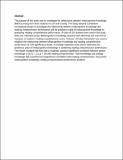| dc.contributor.author | Gachigi, Priscilla N. | |
| dc.contributor.author | Mwathi, Dorothy W. | |
| dc.contributor.author | Dinga, Jotham | |
| dc.contributor.author | Kigen, Edward | |
| dc.date.accessioned | 2025-10-02T08:51:01Z | |
| dc.date.available | 2025-10-02T08:51:01Z | |
| dc.date.issued | 2018 | |
| dc.identifier.uri | https://researchjournali.com/view.php?id=4743 | |
| dc.identifier.uri | https://repository.kcau.ac.ke/handle/123456789/1590 | |
| dc.description.abstract | The purpose of this study was to investigate the relationship between metacognitive knowledge (MCK) among
form three students in Lari Sub County. The study adopted a predictive correlational design to investigate the
relationship between metacognitive knowledge and reading comprehension performance and the predictive
value of metacognitive knowledge in predicting reading comprehension performance. A total of 320 students
were used in the study. Data was collected using a Metacognitive Knowledge Questionnaire (MCKQ) and a
pro forma summary of student’s reading comprehension scores. Pearson’s Product Moment(r) was used to
establish the relationship between Metacognitive Knowledge and reading comprehension performance at 0.05
significance levels. A multiple regression was used to determine the predictive value of metacognitive
knowledge in predicting reading comprehension performance. The results revealed that there was a moderate,
positive significant correlation between person knowledge (r (317) = .21, p < .05 and reading comprehension.
Task knowledge and strategy knowledge had a positive but insignificant correlation with reading
comprehension. | en_US |
| dc.language.iso | en | en_US |
| dc.publisher | Research Journal of Education | en_US |
| dc.subject | metacognitive knowledge, reading comprehension performance, predictor | en_US |
| dc.title | Metacognitive Knowledge As A Predictor Of Reading Comprehension Among Form Three Students In Kiambu County, Kenya | en_US |
| dc.type | Article | en_US |

